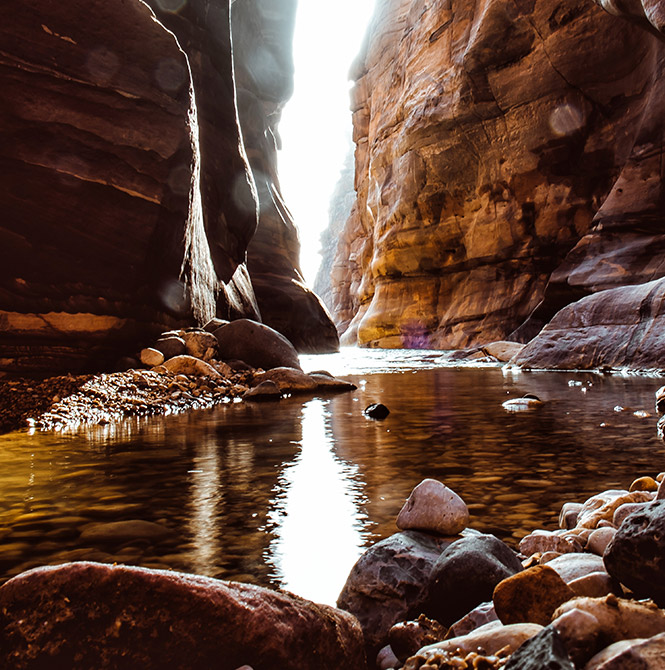
Arnon Stream (Wadi Mujib) is mentioned frequently in many books of the Old Testament of the Bible. On the memorial to King Mesha there is a mention of him for his role in paving the road to the Arnon River. When the Romans conquered the entire region, they paid special attention to the Mujib Road, paving it with stones and erecting monuments on the road, some of which still exist today. They also built castles and established military bases to protect caravans and travelers from dangers.

Many countries disputed sovereignty over this valley, including the kings of the region and neighboring countries such as the Nabataean state, then the Romans and Arabs after them, and many armies passed through the deep valley. The valley witnessed the convoys of trade and its prosperity, as well as the families and merchants on its slopes when they came and back, sometimes with security and stability, and at other times they were exposed to thieves and bandits.
The valley has an ancient name (Arnon), as mentioned in the Bible. The plains and hills on the south of the valley and on the north were under the control of the Moabites state. The Bible mentions in the book of Numbers that the king of the Amorites fought the king of Moab and took from his hand all his land to Arnon. Since that time, Wadi Mujib has become a border, with which the Moabites were never satisfied, but they were seizing every political or military opportunity to regain what they had lost. When the Hebrew people came, Moses considered the political change that occurred following the wars that took place a favorable opportunity, so he asked Moab to allow him to pass through his lands, on the way, and not to encroach on the king of any human being. Eilat and headed east, north, east, avoiding passing through the land of Moab, to reach the Kedemut desert, from which he sent his messengers to Sihon, the king of Hesban, asking him to let him pass through his lands heading to the Promised Land. So, King Hesban refused and gathered all his people and went out to meet Israel in the wilderness (Numbers 21:21-31), and he reached Jahas and fought against Israel.
And the twenty-second chapter of the Book of Numbers mentions how Balak the son of Zippor, the king of Moab, sought help from Balaam the son of Beor and asked him to curse the children of Israel. Arnon was also mentioned in the Book of Deuteronomy (2:24, 36, 3:8, 4:48, 12), in the Book of Joshua (12:1 and 13:9), and in the Book of Judges (11:13). It was also mentioned in the book of Isaiah the prophet (16:3), and in the book of Jeremiah the prophet (48:20).
King Mesha mentions in his monument that he paved the road in Wadi Mujib. And when the Romans came and took over the whole area, they paid special attention to the Mujib Road, paving it with stones and placing the millennium stones on its sides, some of which still stand today. They built castles and set up military garrisons to protect convoys and travelers from the dangers of thieves. Eusebius mentioned in his book The Unomasticon, saying: “The inhabitants of that valley, which lies to the north of Rabbah, which they call the Arnon, consider it a terrible and dangerous place because of its ruggedness. Historians of the region mention that in the fifth century AD, two battalions were stationed in Wadi Mujib: The Third Alpine Battalion" and "the Arab Lucky Battalion.